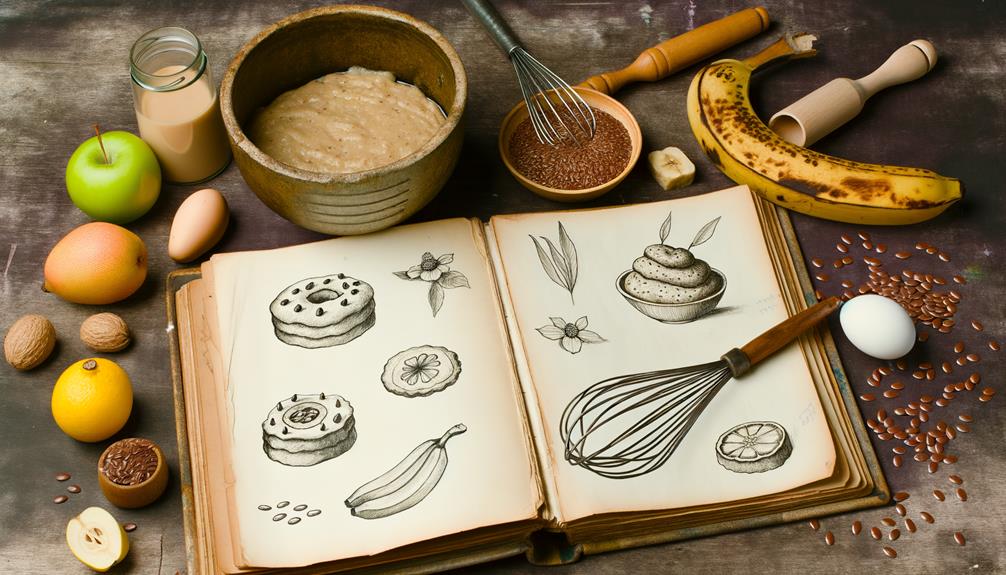Baking beautiful, buoyant breads and other vegan delicacies without baking powder might seem like a daunting task, but it’s not as difficult as you’d think. By understanding the role of leavening agents and exploring the array of alternatives available, you can master the art of vegan baking without compromising on taste, texture, or health. This knowledge not only helps you cater to dietary restrictions and personal preferences but also deepens your connection to various cultures around the world, where traditional baking methods often eschew commercial leaveners. So, how about we embark on this culinary adventure together, exploring the wonders of vegan baking sans baking powder? Stay tuned for some delectable discoveries.
Key Takeaways
- Baking powder alternatives such as vinegar, lemon juice, chickpea flour, and cream of tartar can be used in vegan baking recipes.
- There are various egg substitutes available for vegan baking, including ground flaxseed, mashed banana, carbonated water, and vegan butter or plant-based fats.
- Baking soda can be mixed with vinegar, lemon juice, buttermilk, yogurt, molasses, or coconut oil to create different reactions and help baked goods rise.
- Mastering vegan cake recipes involves using plant-based alternatives for dry and wet ingredients, and replacing eggs with applesauce or mashed bananas for moisture.
Understanding Baking Powder Alternatives
Let’s dive into the world of baking powder alternatives, revealing how ingredients from your very kitchen like vinegar, lemon juice, or even a dash of club soda can revolutionize your vegan baking experience. Ditching traditional baking powder doesn’t mean sacrificing the rise of your favorite baked goods. Combination of baking soda mixed with vinegar or lemon juice can give you that desired lift.
Consider whipping egg replacers, such as chickpea flour, into your recipes. These can help make baked goods rise just as effectively as regular baking powder. You can even create your own baking powder by combining cream of tartar with baking soda. This homemade mixture is especially handy when you’re in need of a tablespoon or so of baking powder.
Don’t underestimate the power of other plant-based ingredients. For instance, self-rising flour or club soda can serve as practical baking powder alternatives, too. Mastering vegan baking is all about being innovative, open-minded, and health-conscious. It’s about using what’s available to serve others delicious, ethically-made treats. It’s about embracing change, and that starts with understanding your options. Let this knowledge guide you on your vegan baking journey.
Vegan-friendly Egg Substitutes
Having explored the alternatives to baking powder, you’re now ready to tackle another challenge in vegan baking – finding the perfect substitutes for eggs. Whether you’re committed to a vegan diet, catering to those with a dairy allergy, or simply seeking healthier options, there’s a plethora of vegan-friendly egg substitutes you can use.
A popular vegan egg substitute is ground flaxseed. Mixing it with water creates a viscous solution that mimics the binding properties of eggs. It’s a great way to ensure your baking remains moist and holds together well. Another plant-based alternative is mashed banana. This fruit adds moisture to your baking and imparts a subtly sweet flavor, making it an excellent choice for non-vegan recipes too.
You can even use carbonated water. It adds volume and lightness to your baked goods, similar to the effect eggs have. Lastly, for recipes requiring the creaminess of eggs, vegan butter or other plant-based fats can do the trick. These substitutes not only maintain the texture and taste of your baking but also align with the health-conscious ethos of veganism. So, go ahead, experiment, and perfect your vegan baking skills.
Experimenting With Baking Soda Mixes
You might not know it, but there’s a world of baking soda mixes out there for you to experiment with, offering healthier and vegan-friendly alternatives to traditional baking powder. In your journey to mastering vegan baking, these mixes can help your baked goods rise just as well, if not better, than conventional methods.
One common way to use baking soda as a leavening agent is to combine it with an acid. Here are a few mixes you can experiment with:
- A teaspoon of baking soda with a tablespoon of vinegar or lemon juice
- Baking soda mixed with vegan buttermilk or yogurt
- Baking soda combined with molasses
- Coconut oil and baking soda for a richer texture
These combinations react to produce carbon dioxide, helping your goods rise beautifully. Remember, each mix may alter the taste somewhat, so it’s all about finding the perfect balance for your baking recipe.
Experimenting with baking soda mixes not only promotes healthier choices but also reflects the versatility of vegan cooking. So, don your apron, gather your ingredients, and let the vegan baking adventure begin!
Mastering Vegan Cake Recipes
Diving into the world of vegan cake recipes, it’s essential to note that a delicious vegan chocolate cake, rich and moist, can be made entirely without animal products, using plant-based alternatives like vegan milk and butter. When you decide to make vegan chocolate cake, you’ll whisk together dry ingredients like flour, cocoa powder, and a pinch of salt. The recipe calls for wet ingredients like coconut milk, an excellent dairy substitute, and a natural sweetener of your choice.
Making the best vegan chocolate cake involves getting creative with how you replace an egg. Applesauce or mashed bananas can add moisture and help bind the ingredients together. To intensify the chocolate flavor, opt for dark cocoa powder. It’s not only about creating a delectable dessert; it’s about fostering a culture of inclusivity and health consciousness.
Tips for Successful Vegan Baking
After mastering the art of vegan chocolate cake, it’s crucial to expand your vegan baking skills further with a good understanding of each ingredient’s role and the best plant-based substitutes. Baking, after all, is a science. It’s time to be creative and use your newfound knowledge to make baked goods that even non-vegans would love.
- First, make sure to find a good substitute for eggs. Flaxseeds, applesauce, and aquafaba are just some of the ingredients you can use. The key is to experiment and find what works well for you.
- Instead of whole milk, opt for unsweetened and unflavored plant-based milks. Soy, almond, and coconut milk are just a few options.
- Vegan butter substitutes like coconut oil or vegetable-based margarine can be easily made at home.
- Instead of using animal-based leavening agents, opt for cream of tartar, vinegar, or even yogurt combined with baking soda.
Frequently Asked Questions
What Can I Use to Bake if I Dont Have Baking Powder?
You can use alternative leaveners like yeast, vinegar, or lemon juice. Experiment with sourdough starters or vegan buttermilk. Try the steaming method, self-rising flour, or cream of vegan tartar. It’s about finding what works best.
Will Something Still Bake Without Baking Powder?
Absolutely, you can still bake without baking powder. Powderless recipes rely on alternative ingredients for leavening options. However, texture and taste differences might occur. Mastering this baking chemistry can be a fun challenge.
Can You Skip Adding Baking Powder?
Yes, you can skip adding baking powder. You’d use baking soda, yeast, or natural substitutes like applesauce instead. These alternatives trigger similar chemical reactions, creating leavening and making your vegan baking successful.
What Happens if You Don’t Bake With Baking Powder?
Without baking powder, you’ll notice texture changes due to altered protein structures. Chemical reactions from rising alternatives, like yeast or baking soda, can cause flavor alterations and affect moisture retention in your baked goods.







